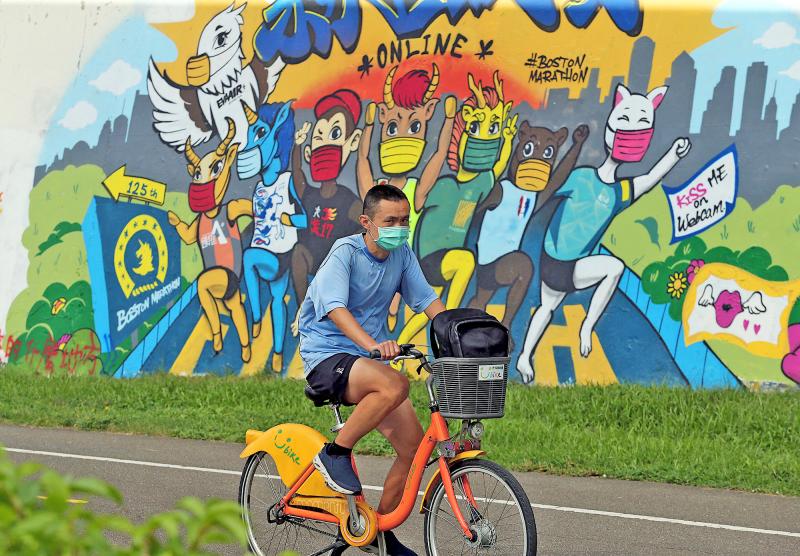A slew of restrictions amid a COVID-19 alert are to be eased from Tuesday next week, including several exceptions to a mask mandate, the Central Epidemic Command Center (CECC) said yesterday.
People will no longer be required to wear masks in five indoor or outdoor settings, said Minister of Health and Welfare Chen Shih-chung (陳時中), who heads the CECC.
These are indoor or outdoor venues for singing and exercising; for photography shoots; workplaces relating to agriculture, forestry, animal husbandry and fish farming; forest recreation areas and beaches; and water facilities, such as cold and hot springs, spas, saunas and steam rooms, Chen said.

Photo: CNA
However, people visiting those places are still required to have a mask, which they should wear if they develop symptoms or cannot maintain social distance, he said.
The relaxations were also announced by Premier Su Tseng- chang (蘇貞昌) earlier in the day at a Cabinet meeting after he received a report on Taiwan’s COVID-19 situation and response measures from the ministry.
Limits on the number of people attending indoor and outdoor gatherings, currently 80 and 300 respectively, and crowd control measures for businesses and public spaces are also to be lifted.
In addition, people are to be allowed to remove their masks to eat or drink on public transportation, including trains, buses, boats and domestic flights, as well as in movie theaters, karaoke outlets and Internet cafes.
Since Sept. 28, people have been allowed to eat and drink at designated areas at bus stations, train stations, and airport and seaport terminals, the Ministry of Transportation and Communications said.
From Tuesday next week, eating and drinking is to be allowed on highway buses, tour buses, ferries, domestic flights, Taiwan Railways Administration and Taiwan High Speed Rail Corp (THSRC) services, as well as in post offices, provided that social distancing measures are followed, it said.
THSRC said that its passengers must wear masks when they are not eating or drinking.
Onboard sales of food would resume as well, it said.
From Nov. 8, THSRC would increase the number of its services to 1,016 per week and resume sales for non-reserved seats, it said.
People with periodic tickets, multiple-trip tickets, and those with tickets paid for via the EasyCard or iPass systems would be allowed to sit in non-reserved seats, it said.
As the CECC has also lifted capacity limits for venues, the transportation ministry said that the Tourism Bureau would end 80 percent limits on service capacity at national scenic areas and amusement parks.
Some entertainment venues, such as nightclubs, disco halls, pubs, hostess clubs and massage parlors would be conditionally allowed to resume services from Tuesday next week, the CECC said, adding that it plans to allow those with hosts to reopen from Nov. 16.
Despite the relaxation of the mask mandate, the CECC said that the COVID-19 level 2 alert, which has been in place since July 27 and was set to expire on Monday next week, would be extended by at least two weeks.

A Ministry of Foreign Affairs official yesterday said that a delegation that visited China for an APEC meeting did not receive any kind of treatment that downgraded Taiwan’s sovereignty. Department of International Organizations Director-General Jonathan Sun (孫儉元) said that he and a group of ministry officials visited Shenzhen, China, to attend the APEC Informal Senior Officials’ Meeting last month. The trip went “smoothly and safely” for all Taiwanese delegates, as the Chinese side arranged the trip in accordance with long-standing practices, Sun said at the ministry’s weekly briefing. The Taiwanese group did not encounter any political suppression, he said. Sun made the remarks when

The Taiwanese passport ranked 33rd in a global listing of passports by convenience this month, rising three places from last month’s ranking, but matching its position in January last year. The Henley Passport Index, an international ranking of passports by the number of designations its holder can travel to without a visa, showed that the Taiwan passport enables holders to travel to 139 countries and territories without a visa. Singapore’s passport was ranked the most powerful with visa-free access to 192 destinations out of 227, according to the index published on Tuesday by UK-based migration investment consultancy firm Henley and Partners. Japan’s and

BROAD AGREEMENT: The two are nearing a trade deal to reduce Taiwan’s tariff to 15% and a commitment for TSMC to build five more fabs, a ‘New York Times’ report said Taiwan and the US have reached a broad consensus on a trade deal, the Executive Yuan’s Office of Trade Negotiations said yesterday, after a report said that Washington is set to reduce Taiwan’s tariff rate to 15 percent. The New York Times on Monday reported that the two nations are nearing a trade deal to reduce Taiwan’s tariff rate to 15 percent and commit Taiwan Semiconductor Manufacturing Co (TSMC, 台積電) to building at least five more facilities in the US. “The agreement, which has been under negotiation for months, is being legally scrubbed and could be announced this month,” the paper said,

MIXED SOURCING: While Taiwan is expanding domestic production, it also sources munitions overseas, as some, like M855 rounds, are cheaper than locally made ones Taiwan and the US plan to jointly produce 155mm artillery shells, as the munition is in high demand due to the Ukraine-Russia war and should be useful in Taiwan’s self-defense, Armaments Bureau Director-General Lieutenant General Lin Wen-hsiang (林文祥) told lawmakers in Taipei yesterday. Lin was responding to questions about Taiwan’s partnership with allies in producing munitions at a meeting of the legislature’s Foreign Affairs and National Defense Committee. Given the intense demand for 155mm artillery shells in Ukraine’s defense against the Russian invasion, and in light of Taiwan’s own defensive needs, Taipei and Washington plan to jointly produce 155mm shells, said Lin,